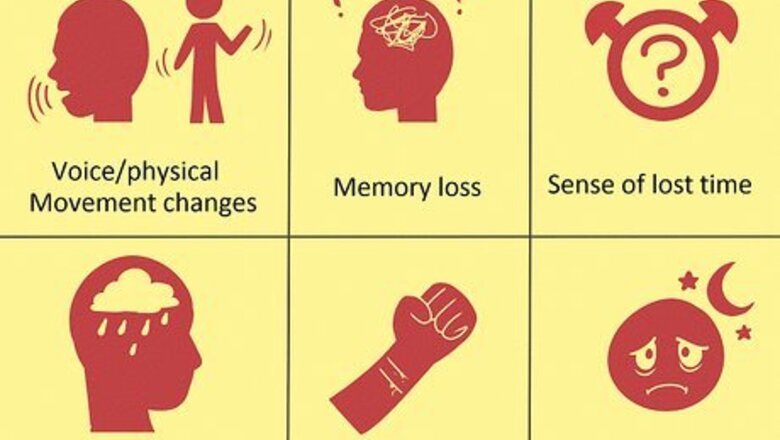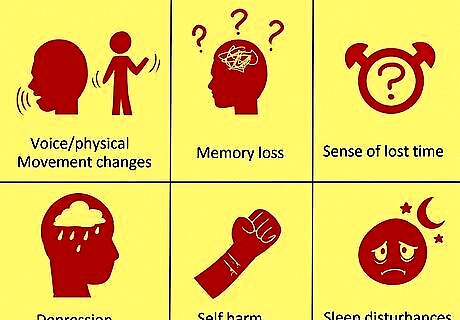
views
Understanding Dissociative Identity Disorder

Know the symptoms. DID is characterized by the presence of alternate identities, often referred to as alters. These identities are often complex, with their own unique histories and physical and behavioral traits. For example, an adult may have a child alter. You may notice changes in voice and physical movement, in addition to changes of attitude and preferences. As different alters present, the person may report loss of memory or a sense of lost time, as they may not be aware when an alter is present. Moving between alters is referred to as "switching" People with DID may also experience anxiety, depression, self-harm, sleep disturbances, and/or drug and alcohol abuse. Severity of symptoms varies greatly among individuals.

Suspend your judgement. People experiencing mental disorders often do not seek or comply with treatment because of stigma associated with being mentally ill. This may be particularly true for people with DID, as it isn't universally accepted as a disorder, despite its inclusion in the DSM-5, the Diagnostic and Statistical Manual of Mental Disorders describing diagnostic criteria for all mental disorders. Avoid contributing to the shame and embarrassment a person with DID may already feel. Acknowledge how difficult it must be to manage the reactions of others. This will show you understand the complexity of living with a mental disorder. Try to meet the person in the place they're at. If someone is having drastic shifts in their mood or personality, you can't stop that. You just have to figure out how to sit with them and be supportive.

Ask questions, if you are familiar with the person. Is the individual is a friend or family member, ask about their experiences to show you care. Strangers may feel very uncomfortable with questions about their mental health, so do not pry. Ask how they feel before and after "switching" to get a better understanding of their experience. Express empathy by recognizing how frightening, confusing, and frustrating these experiences must be. Ask how you can best support them.
Supporting a Person with Dissociative Identity Disorder

Just be there. Shame and stigma often lead people with mental disorders to feel very isolated. Help the person maintain a healthy relationship by actively engaging with them. You don't need to discuss DID. In fact, it may be better to spend time together not discussing the disorder. This may help them to feel "normal." Try scheduling a weekly date to make sure you maintain regular contact. Find an activity you can do together to focus your discussion on something other than DID. Remember to maintain your own boundaries, however. You can be there for someone without getting caught up in everything they're going through.

Join a support group. Support groups are great ways to find others who share similar experiences. Suggest you start attending a support group together to show support. DID is pretty uncommon, so you may not be able to find a support group specific to that disorder in your area. Large cities may have groups designated for Dissociative Disorders but in smaller towns, you may need to look for support groups dedicated to mental health in general. If you can't find a support group in your area, consider joining an online support group.

Be an advocate. Show the person you care and want to support them by joining an advocacy group. This will provide further education and opportunity for you to feel helpful. Encourage the person to join with you. Participating with an advocacy group may help them better understand their social experiences and overcome stigma.
Managing Switching

Help a person with DID avoid triggers. Trauma is common among people with DID, and dissociation is generally associated with severe emotional stress. This means intense emotions may trigger "switching." To help a person with DID avoid switching, help them stay calm in stressful situations. If you see an encounter is becoming emotionally charged, it is best not to make a big deal of it. Drugs and alcohol may also trigger "switching," so discourage use. Avoid asking questions of other alters if the person does switch because this could be dangerous.

Introduce yourself. If you are present when an alter presents the alter may or may not know you. In the event an alter does not know you, the person may be confused or frightened. Help put the person at ease by introducing yourself and explain how you know them. If the person with DID happens to be a spouse, you may want to avoid introducing yourself as a husband or wife with some alters. For example, a child alter may be respond as very confused and an alter of a different gender may become upset by the implications of sexual identification.

Encourage treatment compliance. Treatment for DID typically includes regular counseling and lifestyle changes. People who experience depression and/or anxiety may also be treated with prescription medication. Treatment must be followed to be effective, so support the persons efforts to comply. Encourage the person to attend counseling by offering to go with them. Lifestyle changes usually involve eating a healthy diet, regular exercise, and abstaining from drugs and alcohol. You can encourage adherence to these lifestyle changes by adopting them yourself, at least while you are with the person being treated. Suggest the person set an alarm to remind them to take medication as directed. If the person indicates they are non-compliant or is thinking about becoming noncompliant, urge them to speak to them doctor about treatment options.




















Comments
0 comment